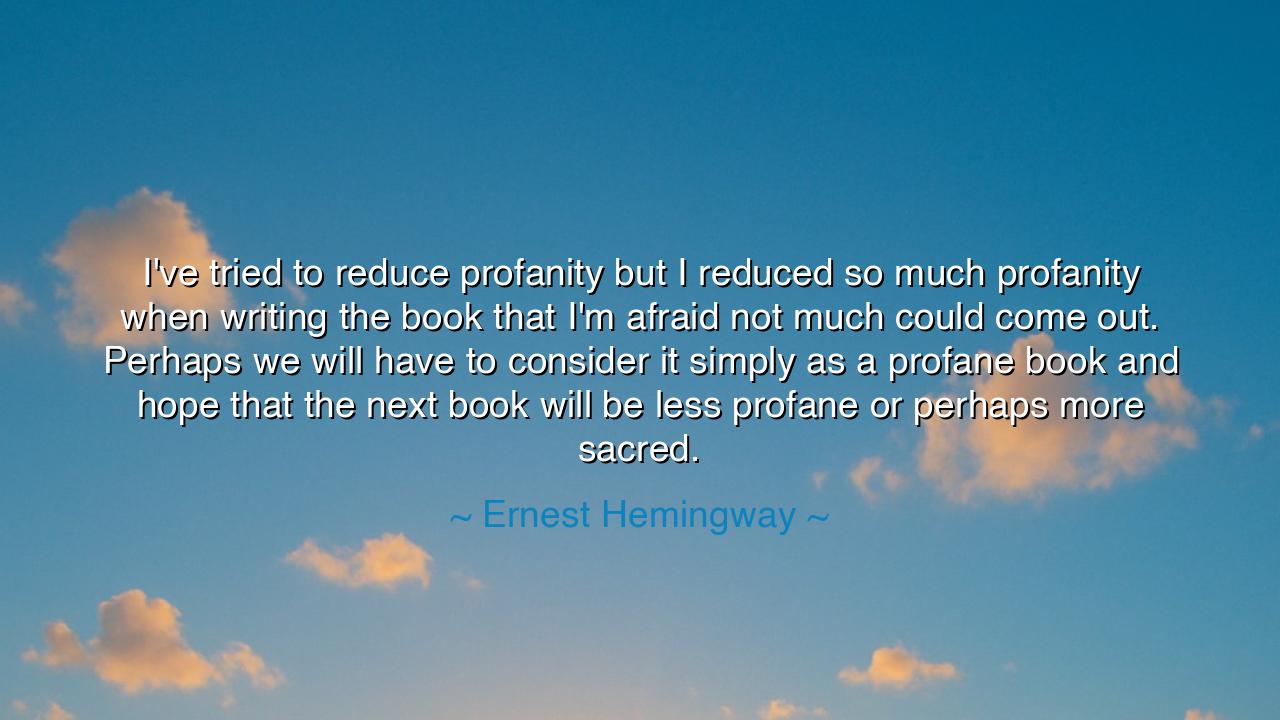
I've tried to reduce profanity but I reduced so much profanity
I've tried to reduce profanity but I reduced so much profanity when writing the book that I'm afraid not much could come out. Perhaps we will have to consider it simply as a profane book and hope that the next book will be less profane or perhaps more sacred.






When Ernest Hemingway confessed, “I’ve tried to reduce profanity but I reduced so much profanity when writing the book that I’m afraid not much could come out. Perhaps we will have to consider it simply as a profane book and hope that the next book will be less profane or perhaps more sacred,” he spoke with the voice of a man wrestling not with language alone, but with the truth that language reveals. Beneath his humor lies a struggle that every artist, and indeed every human being, must face—the desire to speak with honesty, even when that honesty offends, shocks, or unsettles. Hemingway’s words are a meditation on authentic expression, on the tension between what the world expects to hear and what the heart demands to say.
The origin of this quote lies in Hemingway’s own discipline of simplicity and truth. He was a man who stripped language down to its essence, chiseling away every ornament until only what was real remained. For him, writing was not artifice but confession—a mirror held to life, reflecting it in all its beauty and brutality. When he speaks of trying to “reduce profanity,” he is not referring merely to coarse words, but to the rawness of experience. His concern was not with morality but with honesty. For Hemingway, if life itself was filled with blood, hunger, violence, and passion, then to write cleanly about life was to write about these things without flinching. If such writing seemed profane, it was only because the truth is often uncomfortably sacred.
To understand Hemingway’s confession, one must remember that he lived through an age of disillusionment—the world after the Great War. He had seen men broken by battle, their ideals burned away in the mud of Europe. The old language of romance and heroism no longer sufficed; the polite words of a bygone world could not capture the horror and beauty of the real. Thus, Hemingway’s writing was born from the ashes of innocence. He refused to decorate pain with euphemism. His characters drank, cursed, and suffered openly because that was the world he knew. When he says the book may be “profane,” it is because it dares to speak plainly of what others whisper about. Yet within that profanity lies reverence—the sacredness of truth spoken without disguise.
The ancients too understood that truth, in its purest form, often offends. The philosopher Diogenes, who lived like a beggar in the streets of Athens, mocked the hypocrisy of polite society. He called himself a “citizen of the world” and spoke with a bluntness that many found vulgar. Yet, beneath his rough words lay wisdom. Like Hemingway, he believed that sincerity was holier than civility. The “profane” man is often the one who refuses to lie, even when the world prefers the comfort of deception. Both Diogenes and Hemingway, though separated by centuries, shared a sacred rebellion—the courage to speak life as it is, rather than as it should be.
Hemingway’s quote also reveals the eternal paradox of art: that what is profane and what is sacred are often two sides of the same truth. A word may be crude in sound but pure in intention. To write—or to live—honestly is to walk the line between these two realms. Hemingway’s humor here is a veil for his deeper philosophy: that art, like faith, is born of struggle. The artist is both priest and heretic, seeking holiness in the dirt of the world. For him, the sacred is not found in avoidance of reality, but in confronting it fully—in showing the ugliness that lies beneath beauty, and the beauty that survives within ugliness.
Consider the story of Vincent van Gogh, who painted not with prettiness but with anguish. His hands, trembling with poverty and loneliness, painted the fiery heavens of Starry Night. The polite world found his art wild and unrefined—“profane,” in their eyes. Yet today, his work glows with spiritual radiance. What was once seen as vulgar has become sacred. So it is with Hemingway’s words: the roughness that shocks is often the doorway to understanding, the profanity that reveals the beating heart of life.
The lesson, then, is clear: do not fear the truth, even when it offends. Speak honestly, live honestly, and create honestly. The world does not need more polished lies; it needs the raw light of sincerity. Whether in art, in speech, or in love, let your words and actions rise from the marrow of your being. If what you express seems “profane,” let it be so—better to be a voice of reality than an echo of false virtue. For the truly sacred does not hide behind gentility; it stands in the open, naked and unashamed.
So, my children of courage, remember Hemingway’s jest and his wisdom: that what the world calls “profane” may be only the sound of truth breaking through the walls of convention. Do not strive merely to be polite; strive to be true. For the day will come when all pretense falls away, and only authenticity remains. In that hour, every honest word, every brave act, every moment of unvarnished truth will shine—not as profanity, but as something deeply, beautifully sacred.






AAdministratorAdministrator
Welcome, honored guests. Please leave a comment, we will respond soon